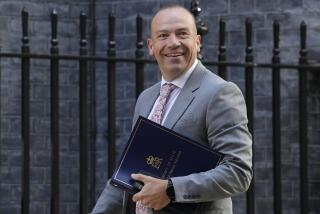IRA’s Guns Are Down, and Now It Is Britain’s Move
- Share via
The Irish Republican Army did the right thing when it moved to consolidate the peace process in Northern Ireland by putting some of its arsenal verifiably and permanently beyond use.
It was a bold gesture, even if made in the context of increasing political and moral pressure in the wake of the Sept. 11 terrorist attacks.
Decommissioning of IRA weapons has been the major sticking point--many would say excuse--stopping the Unionists and the British government from moving forward with reforms in Northern Ireland.
Gerry Adams, leader of the IRA’s political ally Sinn Fein, said Monday that the IRA gesture would deprive the opponents of the peace process of their main argument. What is required now is swift movement by British Prime Minister Tony Blair and Ulster Unionist leader David Trimble to allow the political process to move forward.
Trimble, who leads a badly divided party that lost seats in the last parliamentary election, must show the leadership that won him a shared Nobel Peace Prize in 1998 by vigorously campaigning to bring unionist ministers back into the Northern Irish government and by accepting the IRA move as genuine.
Trimble has said that he will do this, but recently he has been a reluctant leader. He knows that previous leaders of the Protestant Unionists were toppled when they were perceived as being more ready to compromise with the Catholic republicans than their voters were.
Yet Trimble has to make the case that the peace process has secured the Northern Irish link with Britain, that death and destruction have dramatically declined and that there is no going back to unionist political domination.
Blair responded to the IRA gesture by stating correctly that “a significant milestone has been passed.”
And at his Labor Party meeting earlier this month, he admonished obstructionist unionists that there would be “no return to the days of Protestant supremacy because those days have no place in the modern world.” Now he needs to continue to move quickly to dismantle the British military apparatus in Northern Ireland, particularly in the border area of South Armagh, an IRA stronghold.
American support during the current peace process has been critical. It was President Clinton who, against the urging of Prime Minister John Major, granted Adams a visa to visit the United States in 1994. Clinton visited Ireland three times during his presidency, a commitment of time and energy out of proportion to its geopolitical importance.
But President Bush has not made Northern Ireland a priority. Bush needs to be as bold as Clinton was by encouraging Blair, his partner in the war against Al Qaeda, to take advantage of this opportunity. Access to the White House and to other U.S. political leaders--crucial for Sinn Fein’s long-term political goals--should be strengthened.
Bush’s newly discovered multilateral approach to international affairs should be applied to Northern Ireland. If unionists do not respond with generosity, their influence within the administration should be curtailed.
On Sept. 11, the context of Northern Ireland politics changed utterly, and the last act of a grueling national tragedy has opened.
“It would be easier for all of us to dwell on the past, but it is also futile,” Adams told republican activists, many of whom have regarded their war against Britain as a duty.
There are many more now who see peace as their calling, but they need the support of the British and U.S. governments to make sure that their gesture has not been in vain.
More to Read
Sign up for Essential California
The most important California stories and recommendations in your inbox every morning.
You may occasionally receive promotional content from the Los Angeles Times.













